Carpe Glitter Read online
Table of Contents
COVER
TITLE PAGE
CARPE GLITTER
ABOUT THE AUTHOR
ALSO BY CAT RAMBO
COPYRIGHT
Landmarks
Cover
CARPE
GLITTER
a novelette by
CAT RAMBO
Meerkat Press
Atlanta
For Wayne, Always.
CARPE GLITTER, my grandmother Gloria always said. Seize the glitter.
And that was what I remembered best about her, the glitter: a dazzle of rhinestone, a waft of Patou Joy, lipstick like a red banner across her mouth. Underneath all that, a wiry little old lady with silver hair and vampire-pale skin.
Not that she was a vampire, of course. But Gloria Aim hung with everyone who was anyone during her days in the Vegas crowd. Celebrities, presidents, journalists, they all came to her show at the Sparkle Dome, watched her strut her stuff in a black top hat and fishnet stockings, conjuring flames and doves (never card tricks, which she hated), making ghosts speak to loved ones in the audience. And when she stepped off the stage, she left in a scintillating dazzle, like a fairy queen stepping off her throne.
All that shine. And at home?
She was a grubby hoarder.
I mopped sweat off my forehead with the hem of my T-shirt and attacked another pile of magazines. Dust wafted up to fill my nostrils and make me sneeze, drifted down to coat the hairs on my forearms with grit. Something had rotted in the corner; I was doing that side once I’d cleared a path to it and breathing through my mouth in the meantime.
This had once been intended as a guest room, but it had been taken over by a troupe of china-headed dolls, stacked atop piles of brittle newspapers and magazines. No cat pee—I’d been spared that in these back rooms, closed off for at least a couple of decades.
Grandmother had bought the house when she was at the height of her first fortune. She’d just burst onto the stage magician scene, a woman from Brooklyn who’d trained herself in sleight of hand and studied under the most famous female stage magician of her time, Susan Day.
The nearest heap of magazines, in fact, flaking away at my touch, showed Grandmother and her mentor on the uppermost cover, a poster from their brief tour together, just after World War II. Glamorous older Day, blonde hair worn in a sleek chignon and eyes blue as turquoise. Grandmother bright and shiny not just from the rhinestones glittering across her chest, but starry-eyed—her grin so wide it stretched her mouth.
The stack held dozens of copies of the same issue, no matter how far down I went. A swarm of silverfish scurried away as I lifted the last one. I’d get the room cleared before bringing out my arsenal of bug spray for an onslaught.
Yellowed confetti bits fell away as I put the stack on the heap to be bagged up and trashed. By now I’d learned that paper flaking that badly meant the appraiser’s regretful headshake and the murmur, “Too badly eroded, Miss Aim.”
As with each of the seven rooms I’d managed so far, I sorted the contents into piles. Throw away was by far the largest. To be appraised had interesting things in it beyond the scads of dolls Grandmother had collected. Keep was actually two subpiles, one for Mother and one for me.
Object after object to be evaluated and sorted. Old magazines and flutters of candy wrappers. So much clothing, most of it absurdly formal, scratchy with ancient starch. Theater props piled on top of grab bags she’d picked up at church rummage sales, still unopened. Half-filled perfume bottles and compacts full of sweet dust.
And then there were oddities: a picture stitched of human hair, showing a castle on a cliff; an enormous crystal ball, a good foot and a half wide; a mechanical banjo trio that played itself, complete with a library of antebellum songs to choose from; a basket stuffed with sandalwood fans.
The “rotting thing” turned out to be a heap of furs that, when stirred, sent up a stench reminiscent of old sauerkraut that sent me out into the hallway for a while to lean against the yellowing wallpaper and breathe in fresher air.
The doll collection was worth a good bit, perhaps, I’d been told. But nothing on the scale of financial windfall I had hoped for. Grandmother had been wealthy, even though she kept her spending discreet, aside from this strange mishmash of a house. Where had all that money gone?
And why had she saved everything? I thought that it was perhaps a return to her childhood days, which had been uncertain and full of moves. My great-grandfather had been a con man, always on the edge of getting run out of town, according to her stories. They’d had to leave in the middle of the night more than once, abandoning anything that couldn’t go into a suitcase. This could be a reaction to that.
There was no point psychoanalyzing my dead grandmother, though. Once the furs were bagged up and taken out, the room was much more bearable. I kept on searching, working through the last of the piles before examining the desiccated rug underneath, so dry I was worried it might crumble away if I tried to vacuum it.
My cell vibrated against my hip. I slid it out of my shorts pocket and glanced at the screen. My mother.
I took a breath before thumbing the phone on. “Yes?” I said.
“I wish you hadn’t chosen this,” Mother said, launching right back into the same argument we’d been having all week, ever since I’d said, “Actually, I’ll take the second option” at the reading of the will. “It’s ridiculous. You could probably tell them that you’ve changed your mind, that you want the money instead.”
“You never know, I might turn up something wonderful,” I said, trying a new tack. Maybe if I could convince her that there might be treasure buried in the piles and heaps lining this massive amalgamation of three houses, she’d support me in this.
She hissed impatience. At least that’s what that strangled sound had always meant for both her and Grandmother. Mother liked to pretend she was Grandmother’s antithesis, but the truth was, they were more alike than either would have admitted. I had even found a mannerism or two I didn’t think of as mine, but theirs, creeping into my own speech. “Have you found anything?” she demanded.
“Not yet,” I said. “But I’ve only begun to scratch the surface. You have no idea how much stuff she managed to cram into this place. It’s a little mind-blowing.” I toed at the pile I’d been sorting, and it slid sideways with a waft of cedar and old socks that almost made me gag.
“Why are you being so stubborn about this, Persephone?”
“I’m thirty years old. I get to make my own choices. Grandmother offered them to me.” I hesitated before adding, “It’s not your call,” feeling the words slide distance between us when my mother was already so far away.
She hung up without a word. I stared at “Connection terminated” before wiping at my face again, tasting salt on my lips. I was sweating up a storm in this fierce heat. That’s all it was.
***
When I graduated from high school and Grandmother said she wouldn’t pay for college, I pleaded with my mother to intercede. “You caused this,” I said. “I’m not asking you to tell me what happened. It’s all between you and her. I’m not taking sides. But if you went to her . . .”
Mother shook her head quickly, nervously shaking away any chance. Her hands, long fingered and dexterous as my grandmother’s, as my own, twisted in front of her, as though signing negation.
I put my arm down on the kitchen table, and immediately regretted it. We were living in an apartment over a diner; it always smelled of old hamburgers, and every surface acquired a sticky, oily film that felt like cling wrap sticking to the skin. Next door, one of the three Laotian women that lived there began yelling at an
other in one of their interminable arguments.
“No, no,” my mother said, words tumbling, desperation driven. Just the mention of Grandmother sent her into a panic. “Let’s not talk about that. But think of what else you can do. You wrote all those wonderful essays for the literary magazine. Surely they must have some scholarship fund for promising students. Or if you join the National Guard, they’ll pay, and then you’d know what you were doing, straight out of college!”
“Mom.” I shook my head, mirroring her gesture in slow motion. “Do you think I didn’t look into every other option? The time for applying for scholarships is long past. I’d have to postpone school for a year—”
“Then postpone it for a year! You can live here, find a job, put money aside—”
“No!” I’d seen too many other people let a year turn into two, then three. Then never. There’s always something to eat away whatever funds you have.
I had to grab the chance while I could. I’d watched the meager wage my mother made as a secretary in the years since my grandmother stopped subsidizing us melt away every month. Always something—a roof to be fixed, my mother’s ulcer operation, a thousand car problems.
I’d stepped up and managed all that, getting part-time jobs, but never enough. Never money to put away for college. And I hadn’t thought about that, always assuming my grandmother would pay my way. I didn’t expect to live lavishly—I was more than willing to keep working—but without her funds, I was sunk.
I could have cried then, but what good would that have done, other than tying my mother up in knots?
So I went to see my grandmother.
***
Her place was the same as always: a compound of sorts, made up of three houses grown together. No grass lawn, but an elaborate landscape of cacti and other desert plants: huge striped agave and overgrown saguaro that Grandmother had a gardener put in before I was born, long before anyone used terms like “xeriscaping” or “drought-tolerant.”
Two of the houses had started out as single-level, only to gain rooftop decks, gazebos, and a shed-piled-on-shed construction that would have never survived in an area with actual weather. The third and last to be added to the mélange was a three-story Tudor, on the northern side. I came in through the entrance of the first house, which was where Grandmother kept most of the rooms that she used from day to day.
I knew about the hoarding. I’d spent plenty of summer afternoons in my childhood playing in the vast complex, given free rein by my grandmother, who would shoo me off in order to settle in for an afternoon of practicing prestidigitation or designing trick cabinets in her large workshop, which filled a three-car garage and was where I’d built my first birdhouse, bookcase, and tiny wooden box.
The front door, set with a fan of red and gold stained glass, resounded under my knock. Once I would have just let myself in. I still had a key somewhere, but she’d always changed the locks on a yearly basis, although she’d never explain why. Beyond that, every lock had its own individual key, so you had to know which one yours fit.
Inside, though, few doors held locks, other than the door to Grandmother’s inner sanctum, a book-lined study surrounding an enormous ebony and mother-of-pearl desk littered with diagrams and correspondence. Only Grandmother and her secretaries held that key—perhaps the motivation for the yearly lock change, although you would have thought that it only would have happened when one of them left if that were the case.
I used the knocker, an elaborate bronze cast of two Chinese dragons. Grandmother loved mysticism and loaded her act with as many symbols of it as she could. Many of her fans came repeatedly to shows, trying to decipher the potpourri of cabalistic and arcane clues she managed to incorporate into her costumes and equipment.
The door swung open with a waft of musky incense. I’d expected a secretary, but it was Grandmother herself. She’d shrunk; where once she’d reached my ear, she was closer to shoulder high, but still carried herself like the lead flag bearer in a parade.
“Come in,” she said, as though she’d seen me only the day before. She turned and walked away, clearly expecting me to follow her.
I did, stepping into the reception area that was one of my favorite rooms. The enormous bay window showed a view of the cactus garden outside, refracted and split a thousand different ways by the curtain of crystals strung on translucent fishing line. The furniture’s well-worn cobalt velvet presented a silky shimmer in the weave, neon electric minnows scattering across ocean surface. This was where Grandmother often received visitors, not allowing them to enter any deeper into the house.
I didn’t remember it being this crammed, however, stuffed to the point of claustrophobia. The walls were lined with shelves that reached above my head, lined in turn with an array of dolls, ranging in size from tiny to knee-high, dressed in elaborate costumes. I recognized some, dressed to mirror stage costumes Grandmother had worn over the years; I’d played with the originals more than once.
Other dolls stood on the mantelpiece, in a few other odd corners, or lined the windowsills. Some had been placed along the wall, standing, in a long line.
In the corner, boxes were stacked, labels reading “Limited Edition” followed by my grandmother’s name, inset windows showing the dolls inside. The air smelled of horsehair and dust and aging plastic.
The table—placed knee-bump close between two chairs—held a silver tray with coffee pot, cups, cream and sugar, a small plate of cookies, and two cloth napkins. Had Grandmother been expecting me? I couldn’t imagine that my mother would have called ahead to warn her.
I settled into the chair across from her and picked up a cookie as she poured for both of us. Saying nothing, she fixed the cup just the way I liked it—a splash of milk, half a spoonful of sugar—while I nibbled at the edge of the cookie, which tasted like cardboard and lemon.
Without preamble, she said, “You’re here because you need money for college.”
“Not a lot,” I said. “I plan on working to cover my food and housing, and going in-state will keep the cost down.”
“I’m prepared to pay your full tuition and living expenses under specific conditions,” she said.
I blinked. “Which are?”
She set down her own cup in order to tick them off on two fingers. “A. You will attend the university of my choice. B. You will major in the field of my choice.”
“What?” I said. Something between indignation and panic swept through me, made me lean forward. “What university? What major?” Who knew what sort of weirdness she’d arrived at?
“You can go out of state,” she said. “But it must be on the East Coast. Preferably MIT.”
“Why MIT?”
“That’s where Susan Day went. My tribute to her.”
“What was her major?”
“That part doesn’t come into play. I want you to study engineering.”
“What?” My forehead crinkled in puzzlement. “Why engineering?”
“I didn’t say I would explain any of it,” she said, and picked up her cup to take another sip.
I had no leverage, no bargaining power. I agreed to every term she laid out. When I told my mother that I’d be going to MIT, she didn’t ask where the money was coming from or why I’d picked it.
Don’t ask, don’t tell. So I said nothing.
***
Imagine all the detritus a person creates during a lifetime. I’m not talking about trash—food wrappers and old boxes—but objects that we interact with, that we make: grocery lists and summer postcards, books we scrawl notes in during school, journals and letters and drawings.
And photographs. God, the photographs!
Grandmother was a celebrity and celebrities are documented, in slides and old Polaroids and dusty rolls of film. Newspaper clippings and the pinup poses autographed and sent to fans by one of the series of blond male secretaries handling Gran
dmother’s correspondence, invisible as house sparrows. None of them lasted more than a couple of years; none had been mentioned in Grandmother’s will. Much like my mother.
All contained in cardboard boxes with tape gone age-brittle, crumbling when touched. At least the Las Vegas heat and dryness had spared me mold, and insects other than the endless silverfish and occasional scorpion, and somehow, amazingly, it appeared no mouse had ever ventured within these walls. Grandmother must have put down poison for them, or else a secretary had intervened at some point.
I progressed, box by slow box. I picked up the pace as I went, learning to sort better, or perhaps just caring less in the face of this bewildering mass of stuff.
Often I found things that seemed to have been packed by mistake. A roll of paper towels, a willowware bowl full of ancient crackers gone gray as cardboard. A rake swaddled in a blanket. Half a dozen flowerpots, a packet of marigold seeds from 1963, unused gardening gloves and a tiny, dollhouse-sized shovel. Glass ashtrays with cigarette butts and the crumpled ends of joints mingled with the ash. A cracked jar of shea butter. Old Halloween masks and classroom valentines from Grandmother’s childhood, signed in straggling pencil: Ursula, Jimmy, Laverne. Taxidermied animals, including a panda, an iguana, and a goat with a unicorn horn grafted on.
I hoped for treasure. And I did find a few pieces to set aside, here and there, but too often it was trash. Grandmother’s jewelry boxes glittered promise when I opened the lid and let the light in, but all that sparkle was an illusion. Good costume jewelry, the appraiser told me, and not entirely worthless because it was vintage. But far from the dragon’s hoard I’d first thought it to be. How could anything so glittery be worth so little?
The strangest thing I found that first week was a metal hand. Fully articulated and as finely fingered as my own hand, splayed beside it for comparison, although the metal one was larger than mine by half. It wasn’t gold, but it resembled it. And old—it felt decades old. The engraving on it was so fine that I couldn’t make it out at first.

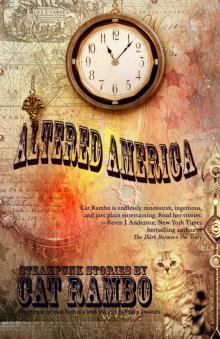 Altered America
Altered America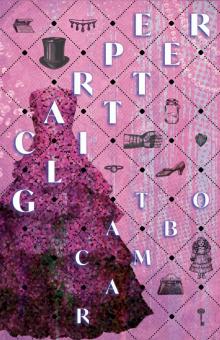 Carpe Glitter
Carpe Glitter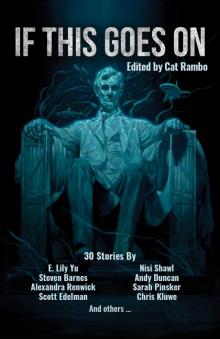 If This Goes On
If This Goes On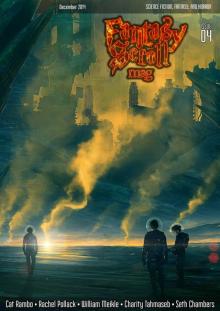 Fantasy Scroll Magazine Issue #4
Fantasy Scroll Magazine Issue #4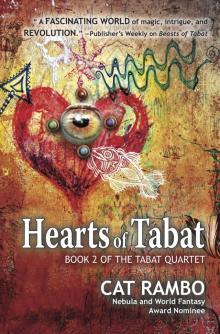 Hearts of Tabat
Hearts of Tabat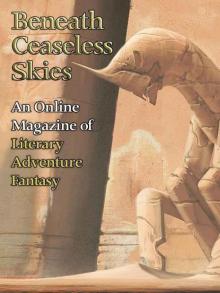 Beneath Ceaseless Skies #151
Beneath Ceaseless Skies #151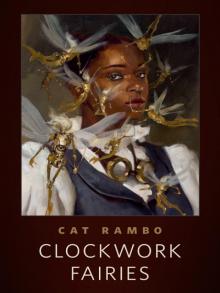 Clockwork Fairies
Clockwork Fairies Beneath Ceaseless Skies #170
Beneath Ceaseless Skies #170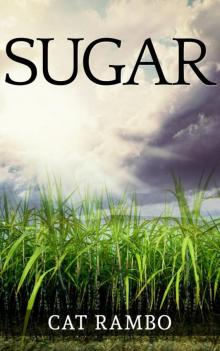 Sugar
Sugar Near + Far
Near + Far Eyes Like Sky And Coal And Moonlight
Eyes Like Sky And Coal And Moonlight